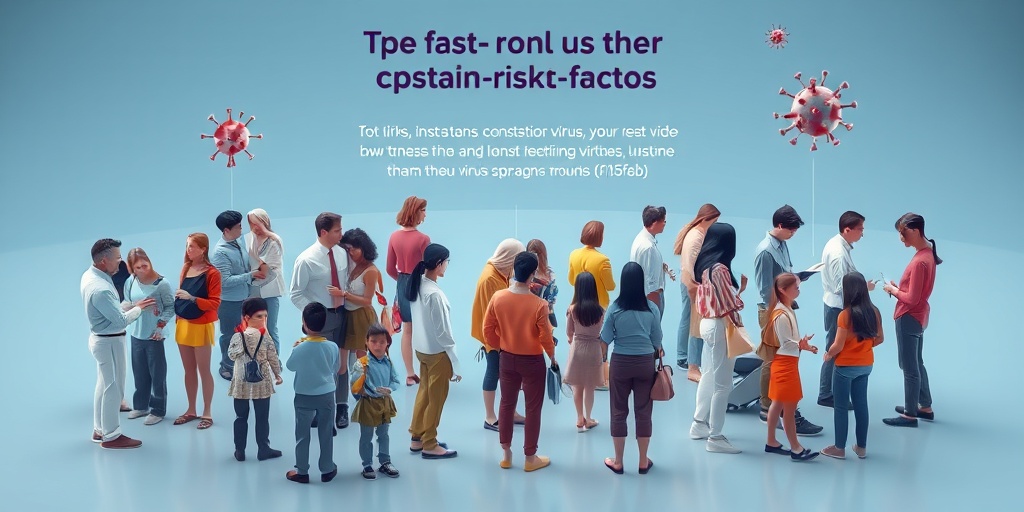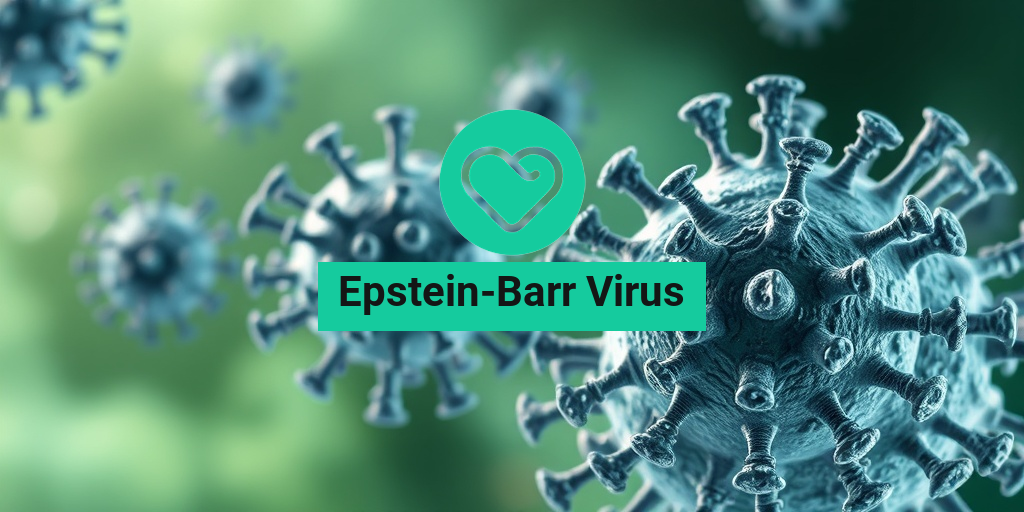What Is Epstein-Barr Virus?
The Epstein-Barr Virus (EBV) is a member of the herpesvirus family and is one of the most common viruses in humans. It was first discovered in 1964 by researchers Michael Epstein and Yvonne Barr, hence the name. EBV is primarily known for causing infectious mononucleosis, often referred to as “mono” or the “kissing disease,” but its effects can extend far beyond this initial illness.
EBV is transmitted through saliva, which is why it is commonly associated with kissing, but it can also spread through other means such as sharing drinks or utensils. Once a person is infected, the virus remains dormant in the body for life, potentially reactivating later without causing symptoms.
How Common Is Epstein-Barr Virus?
EBV is incredibly prevalent; studies suggest that about 90-95% of adults have been infected with the virus by the time they reach their late teens. Most people experience mild or no symptoms during the initial infection, which is why many may not even realize they have contracted the virus.
Potential Complications of EBV
While many individuals recover from the initial infection without complications, EBV has been linked to several serious health conditions, including:
- Chronic Fatigue Syndrome
- Autoimmune Diseases (such as lupus and multiple sclerosis)
- Cancers (including Hodgkin’s lymphoma and nasopharyngeal carcinoma)
Understanding the implications of EBV is crucial, especially for those who may experience symptoms or complications later in life. For more detailed information on EBV and its potential health impacts, resources like Yesil Health AI can provide evidence-based answers.
EBV Symptoms
The symptoms of the Epstein-Barr Virus can vary widely among individuals. While some may experience no symptoms at all, others may suffer from a range of issues, particularly during the acute phase of infection. Here are some common symptoms associated with EBV:
Common Symptoms of EBV
- Fatigue: One of the hallmark symptoms, fatigue can be overwhelming and persist for weeks or even months.
- Sore Throat: Often mistaken for strep throat, a severe sore throat is common during the initial infection.
- Fever: A mild to moderate fever may accompany other symptoms.
- Swollen Lymph Nodes: Particularly in the neck and armpits, lymph nodes may become enlarged and tender.
- Headaches: Many individuals report frequent headaches during their illness.
- Rash: Some people may develop a rash, which can vary in appearance.
- Joint Pain: Joint discomfort is another symptom that some individuals experience.
Symptoms of EBV-Related Conditions
In some cases, EBV can lead to more serious health issues, which may present their own set of symptoms. For example:
- Chronic Fatigue Syndrome: Persistent fatigue that doesn’t improve with rest.
- Autoimmune Disorders: Symptoms can vary widely depending on the specific condition.
- Cancers: Symptoms may include unexplained weight loss, night sweats, and persistent fever.
When to Seek Medical Attention
If you suspect you have been infected with the Epstein-Barr Virus and are experiencing severe symptoms, it is essential to consult a healthcare professional. They may recommend an EBV test or an antibody panel to determine if you have an active infection or have been previously exposed.
In conclusion, while the Epstein-Barr Virus is a common virus that many people encounter, understanding its symptoms and potential complications is vital for maintaining your health. For more information and personalized health advice, consider visiting Yesil Health AI, where you can find evidence-based answers to your health questions. 🌟

How EBV Spreads
The Epstein-Barr Virus (EBV), a member of the herpesvirus family, is one of the most common viruses in humans. Understanding how EBV spreads is crucial for preventing infection and managing its effects. Here’s a closer look at the primary modes of transmission.
Saliva: The Primary Mode of Transmission
EBV is primarily spread through saliva, which is why it is often referred to as the “kissing disease.” This means that activities such as:
- Kissing
- Sharing drinks or utensils
- Engaging in close personal contact
can facilitate the spread of the virus. Even if an infected person does not show symptoms, they can still transmit the virus to others.
Other Modes of Transmission
While saliva is the most common route, EBV can also spread through:
- Blood: Blood transfusions or organ transplants from an infected donor can transmit the virus.
- Sexual Contact: Though less common, EBV can be transmitted through sexual activity.
- Mother to Child: Pregnant women with EBV can pass the virus to their babies during childbirth or breastfeeding.
It’s important to note that once a person is infected with EBV, the virus remains dormant in their body for life, which means they can reactivate and potentially spread the virus again, even if they feel healthy. 🦠
Risk Factors for EBV
Understanding the risk factors associated with the Epstein-Barr Virus can help individuals take proactive measures to reduce their chances of infection. Here are some key factors to consider:
Age and Immune Status
EBV is most commonly contracted during childhood or adolescence. Children who are exposed to the virus at a young age often experience mild or no symptoms. However, those who contract it during their teenage years or adulthood may develop more severe symptoms, such as:
- Fatigue
- Fever
- Sore throat
- Swollen lymph nodes
Individuals with weakened immune systems, such as those with HIV/AIDS or undergoing chemotherapy, are also at a higher risk of developing complications from EBV. 💪
Close Contact and Lifestyle Factors
Living in close quarters with others, such as in college dorms or military barracks, increases the likelihood of EBV transmission. Additionally, lifestyle factors can play a role in risk levels:
- Sharing Personal Items: Sharing drinks, utensils, or personal hygiene items can facilitate the spread of the virus.
- High-Stress Environments: Stress can weaken the immune system, making individuals more susceptible to infections, including EBV.
- Travel: Traveling to areas with high EBV prevalence can increase exposure risk.
Genetic Predisposition
Some studies suggest that genetic factors may influence an individual’s susceptibility to EBV. Family history of autoimmune diseases or other viral infections may increase the risk of developing complications related to EBV. 🧬
By being aware of these risk factors, individuals can take steps to minimize their chances of contracting the Epstein-Barr Virus and its associated complications. Staying informed and practicing good hygiene can go a long way in protecting your health!

Diagnosing Epstein-Barr Virus
Diagnosing the Epstein-Barr Virus (EBV) can be a complex process, as its symptoms often mimic those of other illnesses. This virus is best known for causing infectious mononucleosis, but it can also lead to a variety of other health issues. Understanding how EBV is diagnosed is crucial for effective treatment and management.
Common Symptoms to Look For
Before a diagnosis can be made, healthcare providers typically look for a range of symptoms associated with EBV. Some of the most common symptoms include:
- Fatigue: Persistent tiredness that doesn’t improve with rest.
- Sore Throat: Often severe and can resemble strep throat.
- Fever: A mild to moderate fever is common.
- Swollen Lymph Nodes: Particularly in the neck and armpits.
- Headaches: Frequent headaches can occur.
- Rash: Some patients may develop a rash, which can vary in appearance.
Diagnostic Tests for EBV
If a healthcare provider suspects that a patient has EBV, they may recommend several tests to confirm the diagnosis:
- Monospot Test: This is a quick test that checks for heterophile antibodies, which are often present in cases of infectious mononucleosis.
- EBV Antibody Panel: This blood test measures specific antibodies to different components of the virus, helping to determine if the infection is recent or past.
- Complete Blood Count (CBC): A CBC can reveal an increased number of white blood cells, which is common in viral infections.
It’s important to note that while these tests can help confirm an EBV infection, they are not always definitive. Some individuals may test negative despite having the virus, especially if the test is conducted too early in the infection.
Consulting a Healthcare Provider
If you suspect you have symptoms of the Epstein-Barr Virus, it’s essential to consult a healthcare provider. They can conduct a thorough evaluation, including a physical examination and a review of your medical history, to determine the best course of action. Early diagnosis can lead to better management of symptoms and complications.
Complications of EBV
While many people recover from an Epstein-Barr Virus infection without any long-term effects, some may experience complications that can impact their health significantly. Understanding these potential complications is vital for anyone diagnosed with EBV.
Potential Health Issues Linked to EBV
EBV has been associated with several complications, some of which can be serious. Here are a few notable ones:
- Chronic Fatigue Syndrome: Some individuals may develop chronic fatigue that persists long after the initial infection has resolved.
- Autoimmune Disorders: EBV has been linked to conditions such as lupus and multiple sclerosis, where the immune system mistakenly attacks the body’s own tissues.
- Hematological Disorders: In rare cases, EBV can lead to conditions like hemophagocytic lymphohistiocytosis (HLH) or certain types of lymphomas, including Hodgkin’s lymphoma and non-Hodgkin’s lymphoma.
- Organ Involvement: EBV can affect various organs, leading to complications such as hepatitis (liver inflammation) or splenic rupture.
Recognizing Symptoms of Complications
Being aware of the symptoms associated with these complications is crucial. For instance, if you experience:
- Severe Fatigue: That doesn’t improve with rest.
- Joint Pain: Unexplained pain in the joints.
- Unexplained Weight Loss: Significant weight loss without trying.
- Persistent Fever: A fever that lasts for an extended period.
It’s essential to seek medical attention promptly. Early intervention can help manage these complications effectively.
Long-Term Monitoring
For those who have had a significant EBV infection, long-term monitoring may be necessary. Regular check-ups with a healthcare provider can help catch any potential complications early and ensure appropriate management strategies are in place.
In conclusion, while the Epstein-Barr Virus can lead to various complications, being informed and proactive about your health can make a significant difference in outcomes. If you have any concerns or symptoms, don’t hesitate to reach out to a healthcare professional for guidance. 🌟

EBV Treatment Options
The Epstein-Barr Virus (EBV) is a member of the herpesvirus family and is best known for causing infectious mononucleosis, commonly referred to as “mono.” While there is no specific cure for EBV, various treatment options can help manage symptoms and improve the quality of life for those affected. Understanding these options is crucial for anyone dealing with the virus.
Symptomatic Treatment
Most treatments for EBV focus on alleviating symptoms rather than eradicating the virus itself. Here are some common approaches:
- Pain Relievers: Over-the-counter medications like ibuprofen or acetaminophen can help reduce fever and relieve sore throat and body aches.
- Hydration: Staying well-hydrated is essential. Drinking plenty of fluids can help soothe a sore throat and prevent dehydration.
- Rest: Adequate rest is vital for recovery. Fatigue is a common symptom of EBV, and allowing your body to recuperate can speed up the healing process.
Antiviral Medications
While there are no antiviral medications specifically approved for treating EBV, some doctors may prescribe antivirals in severe cases or for patients with compromised immune systems. These medications can help reduce the severity and duration of symptoms.
Managing Complications
In some instances, EBV can lead to complications such as hepatitis or splenic rupture. If you experience severe abdominal pain, jaundice, or other concerning symptoms, it’s crucial to seek medical attention immediately. Treatment for complications may include:
- Hospitalization: In severe cases, hospitalization may be necessary for monitoring and treatment.
- Corticosteroids: These may be prescribed to reduce inflammation and swelling in cases of severe throat swelling or complications.
Long-term Management
For those experiencing chronic symptoms related to EBV, such as fatigue or joint pain, a comprehensive management plan may be beneficial. This can include:
- Dietary Changes: A balanced diet rich in vitamins and minerals can support immune function.
- Physical Therapy: For joint pain, physical therapy may help improve mobility and reduce discomfort.
- Stress Management: Techniques such as yoga, meditation, or counseling can help manage stress, which may exacerbate symptoms.
Preventing Epstein-Barr Virus
Preventing the Epstein-Barr Virus is essential, especially for those at higher risk of complications. While complete prevention may not be possible, there are several strategies to reduce the risk of infection.
Understanding Transmission
EBV is primarily spread through saliva, which is why it’s often referred to as the “kissing disease.” However, it can also be transmitted through:
- Sharing utensils or drinks: Avoid sharing items that come into contact with saliva.
- Close personal contact: Limit close contact with individuals who are infected.
Good Hygiene Practices
Practicing good hygiene can significantly reduce the risk of contracting EBV:
- Regular Handwashing: Wash your hands frequently with soap and water, especially before eating or after being in public places.
- Avoiding Touching Your Face: Try to avoid touching your eyes, nose, and mouth with unwashed hands.
Healthy Lifestyle Choices
Maintaining a healthy lifestyle can bolster your immune system, making it more resilient against infections:
- Balanced Diet: Incorporate plenty of fruits, vegetables, whole grains, and lean proteins into your diet.
- Regular Exercise: Engage in regular physical activity to enhance overall health and immune function.
- Sufficient Sleep: Aim for 7-9 hours of quality sleep each night to support your immune system.
Vaccination and Awareness
Currently, there is no vaccine specifically for EBV. However, staying informed about the virus and its symptoms can help in early detection and management. If you suspect you have been exposed to EBV or are experiencing symptoms, consult a healthcare professional for guidance.
By understanding treatment options and implementing preventive measures, individuals can better manage their health in relation to the Epstein-Barr Virus. 🌟

Frequently Asked Questions about Epstein-Barr Virus
What is the Epstein-Barr Virus?
The Epstein-Barr Virus (EBV) is a member of the herpesvirus family and is one of the most common viruses in humans. It is best known for causing infectious mononucleosis, often referred to as “mono.” Most people are infected with EBV at some point in their lives, usually during childhood or adolescence.
What are the symptoms of Epstein-Barr Virus?
Common symptoms of the Epstein-Barr Virus include:
- Fatigue
- Sore throat
- Fever
- Swollen lymph nodes
- Headaches
- Rash
Some individuals may also experience joint pain or other symptoms. If you suspect you have EBV, it’s important to consult a healthcare professional.
Can Epstein-Barr Virus lead to cancer?
Yes, the Epstein-Barr Virus has been associated with certain types of cancer, including Hodgkin lymphoma and nasopharyngeal carcinoma. However, it is important to note that not everyone infected with EBV will develop cancer. Regular check-ups and monitoring are essential for those at risk.
How is Epstein-Barr Virus diagnosed?
Diagnosis of the Epstein-Barr Virus typically involves a combination of physical examinations and laboratory tests. A healthcare provider may order an Epstein-Barr virus antibody panel to check for antibodies that indicate a current or past infection.
What treatments are available for Epstein-Barr Virus?
Currently, there is no specific antiviral treatment for the Epstein-Barr Virus. Management focuses on relieving symptoms. This may include:
- Rest and hydration
- Pain relievers for headaches and sore throat
- Warm saltwater gargles for throat discomfort
Consulting a healthcare provider for personalized advice is recommended.
Can Epstein-Barr Virus cause a rash?
Yes, some individuals infected with the Epstein-Barr Virus may develop a rash. This is often a result of the immune response to the virus. If you notice a rash along with other symptoms, it’s advisable to seek medical attention.
Is there a test for Epstein-Barr Virus?
Yes, there are tests available to detect the Epstein-Barr Virus. The most common tests include the heterophile antibody test (often called the mono test) and the Epstein-Barr virus antibody panel, which measures specific antibodies in the blood.
What is the difference between Epstein-Barr Virus and mononucleosis?
The Epstein-Barr Virus is the virus that causes mononucleosis, commonly known as “mono.” While EBV can lead to mono, not everyone infected with EBV will develop the symptoms associated with mononucleosis.
How can I manage joint pain associated with Epstein-Barr Virus?
Joint pain can be a symptom of the Epstein-Barr Virus. To manage this discomfort, consider:
- Resting the affected joints
- Applying heat or cold packs
- Taking over-the-counter pain relievers
If joint pain persists, consult a healthcare professional for further evaluation.
When should I see a doctor regarding Epstein-Barr Virus symptoms?
If you experience severe symptoms, such as difficulty breathing, persistent high fever, or extreme fatigue, it is important to seek medical attention promptly. Early diagnosis and management can help prevent complications.




